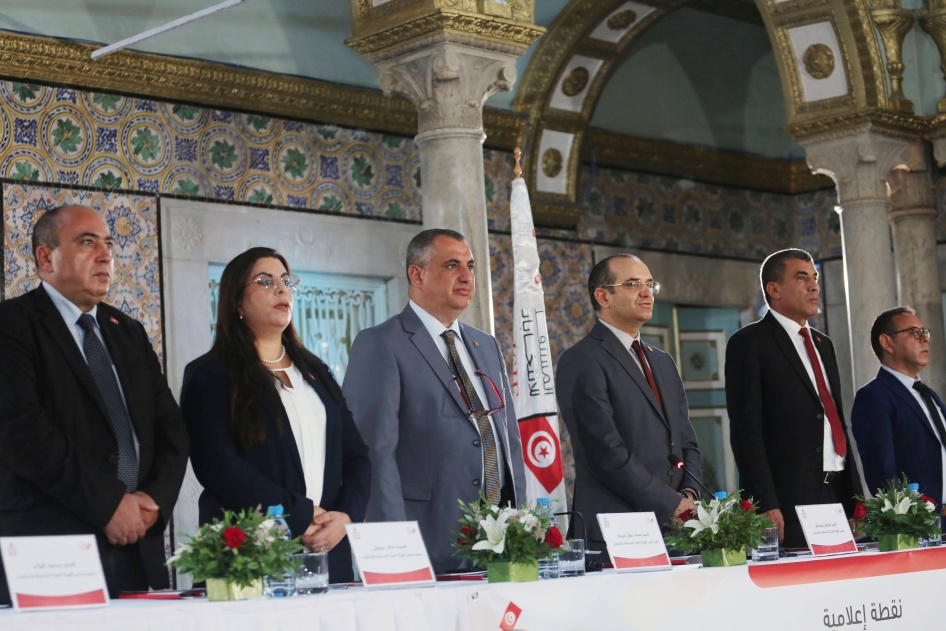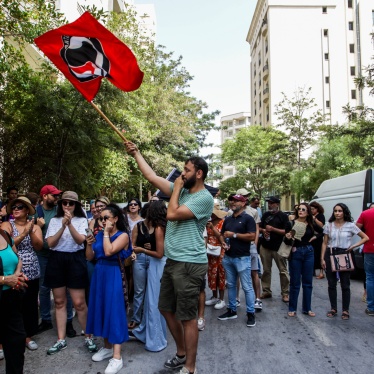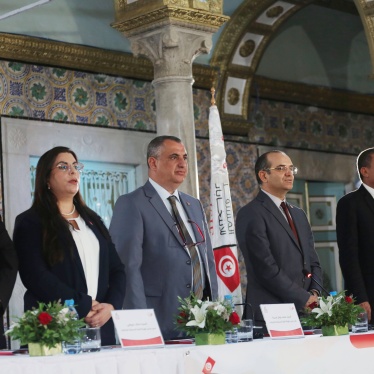(Beirut) – Tunisian authorities have undermined the integrity of the October 6, 2024 presidential election by amending the electoral law just days beforehand, Human Rights Watch said today. The authorities excluded or arrested opposition candidates, and took arbitrary measures against political opponents, independent media, and civil society.
On September 27, Tunisia’s Assembly of the Representatives of the People passed a new law that stripped the Administrative Court of its jurisdiction in electoral matters, preventing it from acting as a check on abuses. Following mass arrests, over 170 people are now detained in Tunisia on political grounds or for exercising their fundamental rights, including more than 110 connected to the Ennahda opposition party. Meanwhile, Tunisia’s electoral commission arbitrarily denied accreditation to election observers and targeted the media.
“Tunisian authorities are systematically placing obstacle after obstacle in the way of a fair election and opposition candidates being able to campaign for president freely,” said Bassam Khawaja, deputy Middle East and North Africa director at Human Rights Watch. “After mass arrests and targeting prospective contenders, they are now changing the electoral law just days before the election, cutting off avenues for meaningful oversight and appeal.”
Following amendments to the 2014 electoral law, the Tunis Court of Appeal will have the sole authority to settle electoral disputes, with decisions subject to appeal before the Cassation Court. The law’s text stipulates that no other judicial authority “may continue to handle disputes, appeals, and decisions related to the 2024 presidential election,” and specifies that this applies to ongoing disputes related to the presidential ballot.
The amendments come just weeks after the Administrative Court ordered the reinstatement of prospective contenders in the presidential race, overturning electoral commission decisions to exclude them. Ultimately, the commission disregarded the court ruling and kicked off the election campaign on September 14 with just three candidates, including current President Kais Saied, Ayachi Zammel, a now-detained candidate, and Zouhair Maghzaoui, a former parliament member.
In the run-up to the election campaign, the authorities have intensified their ongoing crackdown on critics, with mass arrests of political opponents. Security officers arrested over a hundred members or supporters of the Ennahda, the country’s largest opposition party, most between September 12 and 13, a lawyer on their defense committee told Human Rights Watch.
About 17 were released on September 25, but at least 96 are still being held under Tunisia’s 2015 counter-terrorism law, which allows detention without charge for 15 days and without access to a lawyer for 48 hours. They are also being investigated under the Decree-Law 54 on cybercrime, and for “insulting the president,” the lawyer said.
The authorities shut down the Ennahda party headquarters in April 2023 and have detained several of its leaders since December 2022, including the party president, Rached Ghannouchi, and two of its vice-presidents, Ali Laarayedh and Noureddine Bhiri.
The authorities have also prosecuted or jailed at least nine actual or prospective presidential candidates since the start of the electoral period on July 14 and detained at least seven members of their campaigns.
Ayachi Zammel, one of the three approved presidential candidates, was arrested on September 2. A Tunis judge ordered his provisional release on September 5, but he was rearrested that same day, and has since been convicted of crimes and sentenced to several prison terms. On September 18, Zammel was sentenced by a Jendouba court to 20 months in prison and on September 25 to an additional six months. On September 30, a Tunis court sentenced Zammel to a total of 12 years imprisonment and a ban on voting, all on charges of falsifying endorsements’ signatures.
Zammel faces further prosecution for about 30 counts of “knowingly establishing an attestation or certificate stating materially inaccurate facts,” under Article 199 of the penal code, “making donations in cash or in kind to influence voters” under Article 161 of the electoral law, or other charges under the 2004 law on the protection of personal data, two of his lawyers told Human Rights Watch. A member of his campaign team arrested on September 27 was also sentenced to 12 years in prison.
The authorities have intensified a crackdown on civil society organizations ahead of the election. The electoral commission, which Saied restructured in 2022 to place under his control, arbitrarily denied accreditation to two of Tunisia's leading election observation groups, I Watch and Mourakiboun. The commission said in a September 9 statement that the denial was due to “suspicious foreign funding … from countries with which Tunisia does not have diplomatic relations” and that it had referred the cases to the authorities for investigation.
Mourakiboun and I Watch were founded following the 2011 uprisings and have observed elections since 2011. Each group has filed a complaint before the administrative court.
Simultaneously, the electoral commission has increasingly targeted the media, whose work has been severely curtailed in Tunisia. Since July, the electoral commission referred at least one print or electronic media outlet and 18 social media pages for prosecution, said Najla Abrougui, a commission member. It has also reportedly issued at least eight warnings to private radio stations, on suspicions of “undermining or mocking” the commission or the electoral process, “challenging the body’s credibility, independence or transparency,” “imbalanced coverage,” or “lack of neutrality.” On August 20, the electoral body withdrew its accreditation giving access to polling stations from a Tumedia journalist on similar grounds.
The electoral commission has also played a growing role in politically motivated prosecutions against opponents and critics. Since 2022, the commission has filed dozens of complaints against individuals and social media accounts, some which have led to convictions, such as for the president of the Free Destourian Party, Abir Moussi, and two former electoral commission members.
Tunisia is a state party to the International Covenant on Civil and Political Rights (ICCPR) and is required to ensure that every citizen, without discrimination on the basis of political opinion, has the opportunity to take part and vote in genuinely free elections. The United Nations Human Rights Committee, which interprets the covenant, has found that “freedom of expression, assembly and association are essential conditions for the effective exercise of the right to vote and must be fully protected.”
“Tunisian authorities should release all those arbitrary detained and allow civil society organizations and the media to operate freely, including during the electoral process,” Khawaja said. “This blatant crackdown ahead of the election is only undermining its legitimacy.”









